
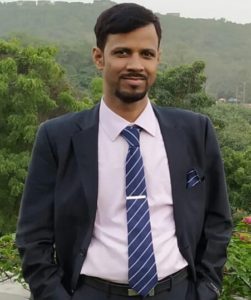
-Dharmananda Deb, Advocate-
Silchar, Assam
The Constitution (One Hundred and Twenty-Fourth Amendment) Bill, 2019 was introduced in Lok Sabha by the Minister of Social Justice and Empowerment, Mr. Thaawar Chand Gehlot on January 8, 2019.The Lok Sabha had passed the bill,with 323 out of 326 MPs present voting in its favour and 3 against.The Bill seeks to provide for the advancement of “economically weaker sections” of citizens.
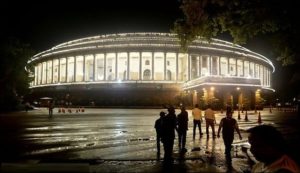 On 9th day of January, 2019 when the Rajya Sabha cleared the bill with 165 votes in favour and 7 against to amend India’s Constitution to allow 10% reservation for the poor in the general category, it equaled a 25-year-old record for the fastest disposal of such an amendment in Parliament. In 1994, the 76th amendment of the Indian Constitution was also cleared in two days flat, parliamentary and legal records show.
On 9th day of January, 2019 when the Rajya Sabha cleared the bill with 165 votes in favour and 7 against to amend India’s Constitution to allow 10% reservation for the poor in the general category, it equaled a 25-year-old record for the fastest disposal of such an amendment in Parliament. In 1994, the 76th amendment of the Indian Constitution was also cleared in two days flat, parliamentary and legal records show.
 Coincidentally, that amendment too concerned reservation.Then Union minister Sitaram Kesari moved the Constitution (Seventy-sixth Amendment) Bill on August 24, 1994. i.e. In the Ninth Schedule to the Constitution, after entry 257 and before the Explanation, the following entry shall be inserted, namely:-“257A. The Tamil Nadu Backward Classes, Scheduled Castes and Scheduled Tribes (Reservation of Seats in Educational Institution and of Appointments or Posts in the Services under the State) Act, 1993 (Tamil Nadu Act 45 of 1994).” Kesari’s bill too was passed by the Lok Sabha on the same day and the Rajya Sabha the following day.
Coincidentally, that amendment too concerned reservation.Then Union minister Sitaram Kesari moved the Constitution (Seventy-sixth Amendment) Bill on August 24, 1994. i.e. In the Ninth Schedule to the Constitution, after entry 257 and before the Explanation, the following entry shall be inserted, namely:-“257A. The Tamil Nadu Backward Classes, Scheduled Castes and Scheduled Tribes (Reservation of Seats in Educational Institution and of Appointments or Posts in the Services under the State) Act, 1993 (Tamil Nadu Act 45 of 1994).” Kesari’s bill too was passed by the Lok Sabha on the same day and the Rajya Sabha the following day.
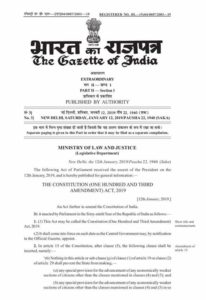
A notification issued by the Ministry of Law and Justice said on 12th day of January,2019 that the Constitution (One Hundred and Third Amendment) Act, 2019 has received the assent of the President of India Ram Nath Kovind and has published in the Gazette of India. As per Section 1 of the Constitution (One Hundred and Third Amendment) Act, 2019 that- “This Act may be called the Constitution (One Hundred and Third Amendment) Act, 2019. It shall come into force on such date as the Central Government may, by notification in the Official Gazette, appoint,” . So with the President’s nod and publication in the Official Gazette viz., the Gazette of India, the bill has now become a law that will provide 10 per cent reservation in education and government jobs.
 Economic reservation in jobs and education is proposed to be provided by inserting clause (6) in Articles 15 and 16 of the Constitution. Article 15 of the Constitution prohibits discrimination against any citizen on the grounds of race, religion, caste, sex, or place of birth. However, the government may make special provisions for the advancement of socially and educationally backward classes, or for Scheduled Castes and Scheduled Tribes.
Economic reservation in jobs and education is proposed to be provided by inserting clause (6) in Articles 15 and 16 of the Constitution. Article 15 of the Constitution prohibits discrimination against any citizen on the grounds of race, religion, caste, sex, or place of birth. However, the government may make special provisions for the advancement of socially and educationally backward classes, or for Scheduled Castes and Scheduled Tribes.
The proposed Article 15(6) enables State to make special provisions for advancement of any economically weaker section of citizens, including reservations in educational institutions. It states that such
reservation can be made in any educational institution, including private institutions, whether aided or unaided, except minority educational institutions covered under Article 30(1). It further states that the upper limit of reservation will be ten percent, which will be in addition to the existing reservations.
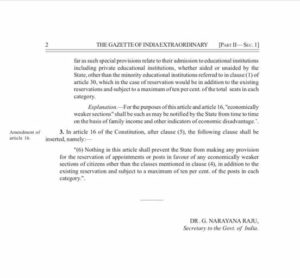
Article 16 of the Constitution prohibits discrimination in employment in any government office. However, the government can allow reservation for any “backward class of citizens”, if they are not adequately represented in the services under the state. The proposed Article 16(6) enables State to make provision for reservation in appointments, in addition to the existing reservations, subject to a maximum of ten percent.
“Economically weaker sections” for the purposes of Articles 15 and 16 mean such sections as notified by the State from time to time on the basis of family income and other indicators of economic disadvantage. This will be a class distinct from the already specified classes of SCs, STs and socially and educationally backward classes.
 Within hours of the Parliament passing the amendment, an NGO named “Youth For Equality”, filed a petition through their engaged Lawyer Senthil Jagadeesan challenging it before the Supreme Court contending that the amendment violates the “basic structure” of the Constitution. Referring to the nine Judge’s bench decision of the Supreme Court in Indira Sawhney case (1992), the petition states that reservation cannot be given on the basis of economic criteria.
Within hours of the Parliament passing the amendment, an NGO named “Youth For Equality”, filed a petition through their engaged Lawyer Senthil Jagadeesan challenging it before the Supreme Court contending that the amendment violates the “basic structure” of the Constitution. Referring to the nine Judge’s bench decision of the Supreme Court in Indira Sawhney case (1992), the petition states that reservation cannot be given on the basis of economic criteria.
In the above-mentioned case i.e. Indira Sawhney Vs. Union of India, 1992 Supp. 3 SCC 217, the Constitution Bench specifically stated that the economic criteria cannot be the sole basis for reservations under the Constitution. The majority holds as follows in Para 799 :-
“It follows from the discussion under Question No. 3 that a backward class cannot be determined only and exclusively with reference to economic criterion. It may be a consideration or basis along with and in addition to social backwardness, but it can never be the sole criterion. This is the view uniformly taken by this Court and we respectfully agree with the same.”
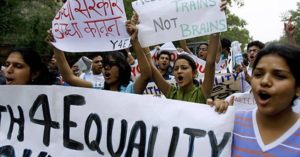 Besides the aforesaid reasons for challenging the Constitution (One Hundred and Third Amendment) Act, 2019 before Supreme Court, other important reasons are as follows :-
Besides the aforesaid reasons for challenging the Constitution (One Hundred and Third Amendment) Act, 2019 before Supreme Court, other important reasons are as follows :-
(a) The economic reservation cannot be limited to the general categories;
(b) The 50% ceiling limit cannot be breached-This Hon’ble Court, speaking through the Constitution Bench in the case of M.Nagaraj Vs. Union of India & Ors ., (2006) 8 SCC 212, upheld the Constitutional validity of Article 16(4A) and the proviso to Article 335 in the following words:
“We reiterate that the ceiling-limit of 50%, the concept of creamy layer and the compelling reasons, namely, backwardness, inadequacy of representation and overall
administrative efficiency are all constitutional requirements without which the structure of equality of opportunity in Article 16 would collapse.”
 In Para 104, the Court specifically states that “As stated above, be it reservation or evaluation, excessiveness in either would result in violation of the constitutional mandate.”
In Para 104, the Court specifically states that “As stated above, be it reservation or evaluation, excessiveness in either would result in violation of the constitutional mandate.”
(c) Imposing reservations on unaided institutions is manifestly arbitrary :- Both the Constitution Bench judgments in T.M.A.Pai Foundation, (2002) 8 SCC 481 and P.A.Inamdar, (2005) 6 SCC 537 make it clear that the State’s reservation policy cannot be imposed on unaided educational institutions, and as they are not receiving any aid from the State, they can have their own admissions provided they are fair,
transparent, non-exploitative and based on merit.
 The Petitioner i.e. NGO named “Youth For Equality” prayed before the Supreme Court by filing writ petition that for quashing the abovementioned Constitution (One Hundred and Third Amendment) Act, 2019 as violation of the basic structure of the Constitution and for staying the Constitution (One Hundred and Third Amendment) Act, 2019 pending the hearing and disposal of the their present Writ Petition.
The Petitioner i.e. NGO named “Youth For Equality” prayed before the Supreme Court by filing writ petition that for quashing the abovementioned Constitution (One Hundred and Third Amendment) Act, 2019 as violation of the basic structure of the Constitution and for staying the Constitution (One Hundred and Third Amendment) Act, 2019 pending the hearing and disposal of the their present Writ Petition.
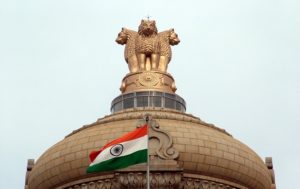 According to the objects of the Constitution (One Hundred and Third Amendment) Bill, 2019, at present, the economically weaker sections of citizens have largely remained excluded from attending the higher educational institutions and public employment on account of their financial incapacity to compete with the persons who are economically more privileged. The benefits of existing reservations under clauses (4) and (5) of article 15 and clause (4) of Article 16 are generally unavailable to them unless they meet the specific criteria of social and educational backwardness.
According to the objects of the Constitution (One Hundred and Third Amendment) Bill, 2019, at present, the economically weaker sections of citizens have largely remained excluded from attending the higher educational institutions and public employment on account of their financial incapacity to compete with the persons who are economically more privileged. The benefits of existing reservations under clauses (4) and (5) of article 15 and clause (4) of Article 16 are generally unavailable to them unless they meet the specific criteria of social and educational backwardness.
The directive principles of state policy contained in Article 46 of the Constitution enjoins that the State shall promote with special care the educational and economic interests of the weaker sections of the people, and, in particular, of the Scheduled Castes and the Scheduled Tribes, and shall protect them from social in justice and all forms of exploitation.
 With a view to fulfill the mandate of Article 46 of the Constitution, and to ensure that economically weaker sections of citizens get a fair chance of receiving higher education and participation in employment in the services of the State, the Union Cabinet has been decided to amend the Constitution of India.
With a view to fulfill the mandate of Article 46 of the Constitution, and to ensure that economically weaker sections of citizens get a fair chance of receiving higher education and participation in employment in the services of the State, the Union Cabinet has been decided to amend the Constitution of India.
Every government has one major role to play in democracy that is to protect the rights of all its citizens. In our country also steps are been taken by both parliament and judiciary to secure justice. Many Government schemes were started for removing poverty across the country, Scholarships were given to weaker section of society so that they can pursue their education without any financial burden, many important legislation were passed. In conclusion it will be important to stress, that India has not the shortage of laws for securing justice, it has only the shortage of commitment for implementation of the laws.
 It will be very beneficial for political elite to understand that no country can be called as developed in true sense until it secure justice to each and every section of society. It should also be remembered that it is not only the responsibility of political elite to work for achieving justice to all the section of the society, in fact it is duty of every Indian to assist his country man so that justice can be secured to every section of the society.
It will be very beneficial for political elite to understand that no country can be called as developed in true sense until it secure justice to each and every section of society. It should also be remembered that it is not only the responsibility of political elite to work for achieving justice to all the section of the society, in fact it is duty of every Indian to assist his country man so that justice can be secured to every section of the society.




